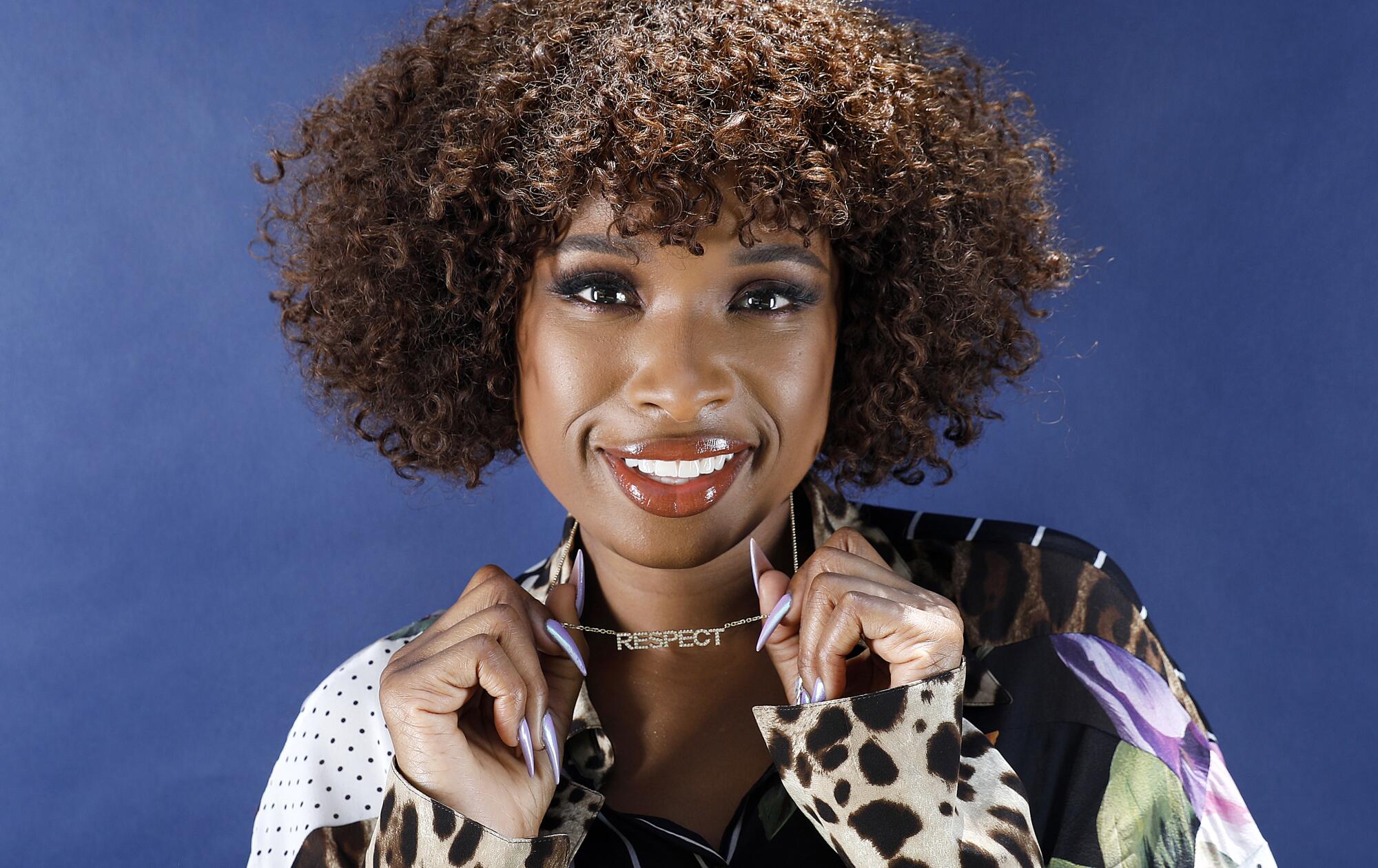
- Share via
Jennifer Hudson knew she had her work cut out for her when she agreed to play the Queen of Soul. “You just can’t wake up one morning and decide ‘I’m gonna be Aretha Franklin,’” said Hudson. “I mean, her voice. Her legacy. The songs. Who she is to all of us. It was daunting. There were times when I was like, ‘Jennifer, what have you done?’”
The answer is “Respect,” the highly anticipated biopic sanctioned by Franklin, who handpicked Hudson for the role before her death in 2018. The film chronicles the late singer’s rise from her father’s church choir to international stardom, shining a light on the talent and the stories behind the songs.
“‘Respect’ is the song and the hit we all love from the gifted Aretha Franklin,” says Hudson. “But when you add her life narrative around it, it’s that much more powerful. Understanding the era she grew up in and the courage that she had and her activism. Her relationship with Dr. King and Angela Davis. It’s like, wow, you see all sides of the human and the way she used her art to reflect herself and support others and be an advocate. So now it’s more than just the song. It’s more than just the artist. Knowing her history helped me understand her legacy and understand why her impact has been so great.”
The film, which hits theaters Aug. 13 after decades of planning and a year of COVID-related release delays, moves from Franklin’s religious upbringing with the charismatic but controlling Reverend C.L. Franklin to her hard-won stardom of the 1960s to a spiritual return to gospel music with her highest-selling album ever, 1972’s “Amazing Grace.”
Rather than lip sync to pre-recorded tracks, Hudson belted out The Queen’s material live on set during filming (“Aint No Way,” “Chain of Fools,” “Think”) as did the rest of the cast — which includes Tony award winner Audra McDonald portraying young Aretha’s mother and Broadway talents Hailey Kilgore and Saycon Sengbloh playing her sisters Carolyn and Erma Franklin (the women’s harmonizing alone is worth the price of admission).
But Hudson is a singular force. The former “American Idol” contestant, who like Franklin grew up singing in church, emotes with the same passion that won her an Oscar for 2006’s “Dreamgirls,” using her powerhouse vocals to re-create iconic moments in music history including the birth of Aretha’s own sound in Muscle Shoals’ Fame studio and a knock-‘em-dead performance of the film’s namesake at Madison Square Garden. With Hudson and other music-minded folks on board, “Respect” is the rare biopic where the celebrated artist’s compositions also land a starring role.
“I wanted to make a movie where music was front and center,” said director Liesl Tommy. Known for her work on Broadway, including her Tony-nominated direction of the play “Eclipsed,” “Respect” marks Tommy’s first time directing a feature film. “Aretha was capable of so much power when she sings and so much delicacy and nuance. I wanted the way that we feel listening to her music to be the way that we felt watching the film. Another thing that guided me is that she has so much emotion in her singing. I felt that the film should be emotional too because that’s who she was. And even though she was very protective of her private life, her private life is all over her music.”
Written by Tracey Scott Wilson (a playwright who has also written for TV series including “The Americans” and “Fosse/Verdon”), “Respect” stars Forest Whitaker as Franklin’s father, Marlon Wayans as her husband and manager, Ted White, and Tituss Burgess as the gentle Reverend Dr. James Cleveland. Mary J. Blige plays diva Dinah Washington and Marc Maron is pushy Atlantic Records exec, Jerry Wexler.
“Respect” follows in the footsteps of other biopics, such as “Coal Miner’s Daughter,” “Ray” and “Walk the Line,” that dared to tackle the legacies of treasured singers. And as American icons go, Aretha is right at the top. .
The pressure of portraying her was not lost on Hudson. “I was calm on set. The freakout came later,” said Hudson recently while in Los Angeles to promote the film. She arrived to the interview wearing a necklace that spelled out “R.E.S.P.E.C.T” in gold letters. She had it made as a memento of the film because “it’s not every day you get to be the Queen of Soul,” she said, slipping on pink, fuzzy slippers after shedding a pair of deadly high stilettos she donned for a photo shoot.
Hudson worked with acting and dialect coaches for the role, and she turned to the legendary Patti LaBelle for insight into the experience of Black female artists in the 1960s. “They had a lot less freedom and women took up less space” says Hudson. “Ms. Franklin spoke up with her music.”
Hudson took her job seriously, learning to play piano for the role: “I’m really still trying to get’ Dr. Feelgood.’ I got the piano part, but now I’ve got to figure out how to sing it while playing it. It’s a process.” Slipping into fabulous reproductions of Aretha’s wardrobe was easier, though Hudson counted 83 costume changes and 11 different wigs (the beehive was her favorite). “And I loved her clothes in the birthday scene. She’s wearing a gold dress and a big fur. I couldn’t help but feel royal.”
Hudson grew up in 1980s Chicago worshipping Whitney Houston, but by the time she auditioned for “American Idol,” her song of choice was Franklin’s version of “Share Your Love With Me.” Even the jaded Simon Cowell was impressed (still, she lost the competition in 2004 when she came in seventh). But Hudson’s personal associations with The Queen’s catalogue had its disadvantages when she was prepping for the film.
“Playing her is a completely different thing from being a singer and fan who sings her songs,” said Hudson. “I mean, thank God I already knew the majority of her material. That was one less thing I had to worry about. But I remember saying on the set, ‘She doesn’t know this song yet.’ Jennifer Hudson knows the song. We all know the song. We know what it became. But in Aretha’s life, in that moment, she doesn’t. She’s learning it. It hasn’t manifested yet. We can’t overshoot the story and speak of her as who she became because we’re in the beginning phases of the making of Aretha.”
Tommy said she too had to break from her own personal associations with Franklin’s work in order to approach the story with a fresh perspective. “When you listen to music and there’s a song that you love, you’re bringing yourself to that,” said Tommy. “It’s like it becomes your personal soundtrack and it’s about your life. So there’s a detaching from how I felt when I was 8 years old that I first heard ‘Natural Woman.’ It’s not about me sitting in a window looking at the rain. It’s something else. You just have to give over to her and her story and her history and that was the great joy of this — discovering the music in a brand new way.”
Tommy and Wilson did extensive research into Franklin’s life to ensure the film was as accurate as possible, from her pregnancy at age 12 to her plight in the studio as the only female musician to her friendship with the Reverend Martin Luther King Jr. For the religious and gospel references, it helped that Wilson’s father and grandfather were Baptist ministers.
Franklin herself had also reportedly been involved in the planning of her biopic up until a week before her death, and more recently, her family and estate made themselves available to the filmmakers. The scenario was quite different for another recent television biopic, National Geographic’s four-part limited series “Genius: Aretha,” which earned an Emmy nomination for star Cynthia Erivo but was blasted by Franklin’s family for its apparent inaccuracies.
“[Franklin’s family] really trusted us, which is a great gift,” said Tommy. “I will never stop being grateful to them for how they sensed our care and sensed that we were two Black women who would die before we let anything not be right in this film. ... In the past, these stories about Black people were pretty often written and directed by white men. Aretha was so real. She was so authentic. I wanted this film to feel like it was undeniably her world and it wasn’t from some kind of voyeur’s perspective. It was from a lived-in perspective. It was really important that her realness be present inside of the film.”
Hudson met Franklin when both women were doing what they loved best: performing on stage. “I got to open up for her in Merrillville , Ind. in 2003 at one of her concerts,” says Hudson. “It was like, ‘Oh my God, I get to sing at Aretha Franklin’s show. She allowed me to do this!’ That was a moment in itself. And then after I won the Oscar for ‘Dreamgirls’ [in 2007] we had a meeting about the possibility of me [portraying] her. ... Years later she called me when I was doing [the Broadway revival of] ‘The Color Purple’ and she said, ‘I’ve made my decision on who I want to play me. It is you. Don’t say anything to a soul.’ And I’m like, ‘Yes, ma’am. I won’t.’ Now here we are. It was like holding my breath for 15 years.”

During that time, Hudson has released three albums, appeared in countless TV series and films (“Sex and the City,” “Empire,” “The Secret Life of Bees,” “Cats”), did Broadway and had a son with professional wrestler David Daniel Otunga. She also overcame the 2008 murder of her mother, brother and nephew by her sister’s estranged husband. Hudson has said she made it through the tragedy thanks to her faith.
The church is embedded in Hudson’s soul. And apparently, so is Franklin’s influence. “I didn’t realize until researching and even shooting ‘Respect’ that ‘Amazing Grace’ and ‘Precious Little Words,’ songs from her ‘Amazing Grace’ album, they were the same versions I grew up singing in church. I was brought up in a church too. We sang ‘Amazing Grace’ every Sunday. But to learn it was her renditions, it’s like wow. So she’s always been there.”
Hudson sang “Amazing Grace” at Franklin’s funeral, 50 years after Franklin sang “Take My Hand, Precious Lord” at King’s memorial. “She was courageous enough to take a stand,” says Hudson of Franklin’s involvement in the civil rights movement. “She used her platform to respond to the times. She fought so hard to get there, and that could have taken her down, but she did it. She left us an example — for us to keep pushing. That’s what got me through this whole thing — her saying, ‘Jennifer, go on.’ I’m like, ‘I don’t know if I’m as courageous as you, but if you think I can, I’m going to give it a try.’”
More to Read
Only good movies
Get the Indie Focus newsletter, Mark Olsen's weekly guide to the world of cinema.
You may occasionally receive promotional content from the Los Angeles Times.











